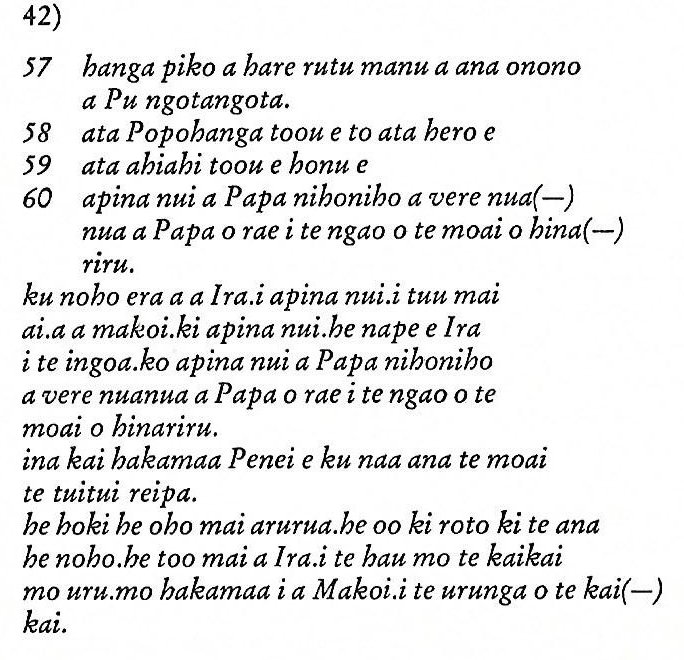| Te vai rutu manu a koro
rupa.e haho e hivi e e runga e te puku ohu kahi
e. Rupe.
Ta.: a pigeon. Mq.: upe, id.
Sa.: lupe, id. Ma.: rupe, id.
Churchill. Ha.: lupe, a kite;
lupe-a-keke, the sea-egle. Sa., Fak.,
lupe, pigeon. Ta.: rupe, id.;
rupo-rupo, be giddy, to reel, stagger. Fiji,
rube, to hang up, suspend ... Fornander.
Haho. Outside. Vanaga. Hahoa
(ha causative, hoa) to cut, to
wound, to hurt. PS Mgv.: tahoa, to make
papyrus by beating. Sa.: foa, to chip, to
break. To.: foa, to crack, to make an
opening. Fu.: foa, to dig, the rent in a
mat. Underlying the Nuclear Polynesian
significations the primal sense seems to be that
of a hole. The Rapanui, a causative, is a
clear derivative in the cutting sense; wound and
hurt are secondary within this language. The
Mangarevan composite means 'to beat until holes
appear', which is a distinctive character of the
beaten bast of the paper mulberry in the
condition in which it is ready for employment in
making tapa. Churchill.
Puku.
1. To feel an urge to defecate or to
urinate, etc.: ku-puku-á te mimi: to need
to urinate. 2. Rock, boulder: puku ma'ea;
puku oone, hillock, earth mound. 3.
Puku tagata, pubis. Puku-ine, to get
stuck in the oesophagus (of food). Pukupuku,
joints, bones of a joint; pukupuku rima,
wrist bones; pukupuku va'e, ankle.
Pukuraga, followers, disciples, students.
Vanaga. 1. Puku haga oao, east, east
wind. 2. Pubes. T Mgv.: puku, clitoris;
pukuhou, the age of puberty; pukutea,
a man between 30 and 45. 3. Unripe; puku no,
unripe; pukupuku, green, immature. Mgv.
puku, to be unripe. Mq.: puku, a
fruit which has not yet reached its maturity. 4.
To gorge; mahaga puku, to take the bait
greedily. PS Sa.: pu'u, to take the whole
at one mouthful, to put into the mouth whole.
Fu.: pukupuku, to rinse the mouth, to
gargle. Niuē:
puku,
to take into the mouth. Pukuhina,
(puku
4), to choke on a fishbone. Pau.:
pukua, to choke
with a fishbone. Mgv.: pukua,
to be suffocated by anything that sticks in the
throat. Mq.: pukua,
bad deglutition. Ta.: puunena,
puufeto,
to choke, to gag. Ha.: puua,
to be choked, to have something sticking in the
throat. Pukupuku;
1. Elbow. G. 2. Wrinkled, knotty, wen, scrofula;
gao pukupuku,
scrofula. T Pau.: puku,
a swelling; pukupuku,
a wrinkle, knotty, rough. Mgv.: puku,
a knot in the wood; pukupuku,
knotted, rough, uneven, lumpy. Mq.:
puku, knot in
wood, boss, protuberance, tumor, boil;
pukupuku,
wrinkled, knotty. Ta.: puú,
boss, protuberance, swelling; puúnono,
tumour; puúpuú,
wrinkled, knotty. Pukuraga,
servant T. Churchill.
Kahi. Tuna; two sorts: kahi aveave,
kahi matamata. Vanaga. Mgv.: kahi, to
run, to flow. Mq.: kahi, id. Churchill.
Rangitokona, prop up the heaven! //
Rangitokona, prop up the morning! // The
pillar stands in the empty space. The thought [memea]
stands in the earth-world - // Thought stands
also in the sky. The kahi stands in the
earth-world - // Kahi stands also in the
sky. The pillar stands, the pillar - // It ever
stands, the pillar of the sky. (Morriori
creation myth according to Legends of the South
Seas.)
"The 'watering place' where the bird beats (the rhythm)'
- wordplay, 'where a certain chant is being recited' -
is located near Hanga Piko.
A recitation provides the following information for the
additional name: 'In Koro Rupa is the house where one is
made to laugh; in Kere Mea is the house where one is
made fun of' (Barthel 1960:851; Campbell 1971:400).
There the rule of the new birdman was celebrated
(compare koro 'feast').
In RAP., koro rupa seems to have the same meaning
as in TUA. kororupo, which describes a paradise.
In the cosmology of the TUA., the name also referred to
the entrance to the underworld.
Hivi (maybe the same as hi ivi 'to fish
with a hook made from bone'; compare the narrative
ME:363) is 'outside', and 'the elevation from where (the
catch of) the tunafish is announced' is 'above'. This is
a reference to a large boulder beside the place where
the canoes docked in Hanga Piko. There the people waited
for the canoes to return from the fishing grounds." (The Eighth
Land,
pp. 89-90.) |

